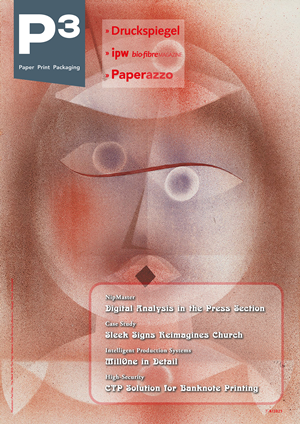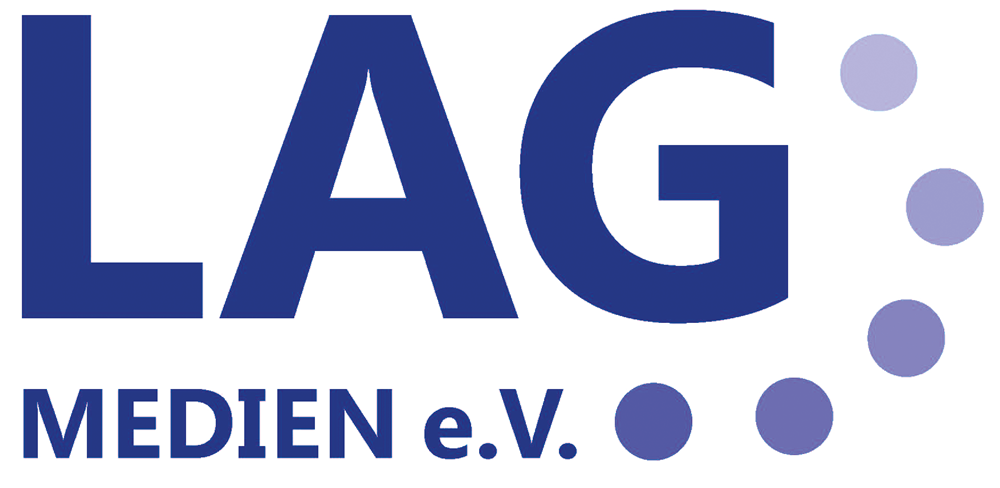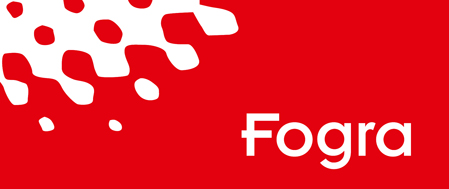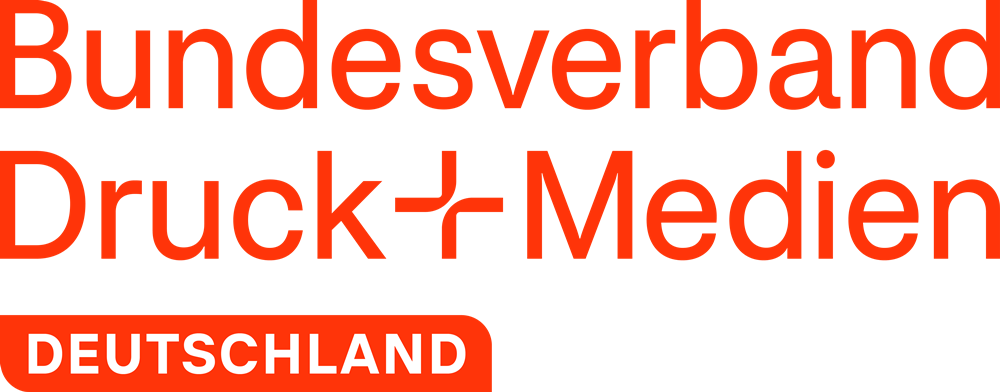P3 1-2/2024 en
German Federal Association of Printing and Media
“As Far as we Know, This is Window Dressing!”
Industry Interview

Under the campaign motto “Environment. Consciously. Printed.”, the bvdm and all eight regional associations started a communication offensive on the sustainability of print.
On January 1, 2024, fully qualified lawyer Kirsten Hommelhoff took over the main management of the Federal Association of Printing and Media e.V. Her predecessor, Dr. Paul Albert Deimel left the association after 13 years due to age. Hommelhoff is taking the lead in difficult times for the industry - and of course in the run-up to the eagerly anticipated drupa in Düsseldorf. More than enough reasons for an extensive interview ...
Under the campaign motto “Environment. Consciously. Printed.”, the bvdm and all eight regional associations started a communication offensive on the sustainability of print.
Ms. Hommelhoff, on behalf of our readers, I would like you to first tell us something about your professional career to date.
Kirsten Hommelhoff: I studied law at the Julius Maximilians University in Würzburg and at the Ludwig Maximilian University in Munich, completed an Erasmus course at the Università di Bologna and also completed a Master of Laws in European Law at the university of Exeter acquired. After working as office manager for the FDP parliamentary group leader and later president of the European Investment Bank, Dr. Werner Hoyer, I was responsible for corporate governance as well as for the board and supervisory board meetings at Deutsche Bahn in the corporate board office. I then worked for Stiftung Mercator for ten years, where I most recently headed their Berlin office. From 2020 to 2023, as Secretary General, I led the largest and oldest foundation association in Europe, the Federal Association of German Foundations. During this time, I strategically realigned the association and professionalized the representation of interests at national and European levels.
The general conditions for the printing and media industry are currently not the best - and not just in Germany. What currently appeals to you about your new position in the Federal Association of Printing and Media?
K.H.: Many industries are currently suffering from difficult conditions. And as a downstream industry, we are of course particularly affected by a weakening economy - also because print is represented in so many different sectors. Because of the pressure to save money, many companies tend to initially focus on communication – including print. Nevertheless – even despite increasing digitalization – a world without print is unimaginable. Around 80,000 new books in Germany (with a still weak market share for e-books of 7.9 percent) show people's sympathy for printed works. The web market is currently picking up again, which also helps print. And although Rewe has abolished its brochures, it is now investing more intensively than ever before in newspaper advertisements. Every supermarket is still a showcase for the industry and almost all areas of the economy and society are absolutely dependent on printed products. Also politics. Many people are not even aware that all parliamentary proceedings in the German Bundestag - from draft laws to small questions - are printed. Because print is more secure than digital communication and longer texts on paper are demonstrably easier to understand. And the classic political election with pen and paper has also trumped all attempts at digitalization. There were attempts at e-voting in many countries, but they were always rejected. Maintaining the secrecy of the vote and verifiability of the “One Man – One Vote” principle is still safest with a pen and printed piece of paper. This is one of the reasons why the printing and media industry is considered to be largely systemically relevant. By the way, we show what print products actually achieve and where they offer added value without any alternative in the “Print makes more of it” campaign on our website.
„When forced to make savings, many companies tend to initially focus on communication – including print.“
So one thing is clear: our industry and therefore the printing and media associations are – like so many others – facing major challenges and a lot will change. I have set out to provide the industry, the regional associations and therefore the companies with the best possible support in this important process. That's a big attraction for me. And as a former competitive rowing athlete, I also know that success depends heavily on whether a team functions well. The bvdm and the regional associations are a very strong community and that is even more inspiring.
The problem areas that the economy is confronted with have remained unchanged for some time - or are increasing: wars, supply chain problems, high costs (including in the energy sector), a shortage of skilled workers, uncertain order situations. What do you think will be the biggest challenges in the coming years and what opportunities does the bvdm have to help guide and support the future?
K.H.: The major bvdm industry survey 2023 identified the strongest business risks for printing and media companies. The top five included rising labor costs, increasing skills shortages, rising energy prices, strong fluctuations in orders and declines in sales due to the increase in online communication. The printing and media associations therefore support the industry companies in implementing resource- and energy-efficient, i.e. cost-saving, processes and in finding skilled workers and trainees. Since the end of February, a job board on the websites of all printing and media associations has been helping our member companies find the right people.
At the same time, the bvdm is of course campaigning on a political level, e.g. against the excessive time-consuming and cost-intensive bureaucracy, against impractical requirements of the Supply Chain Act, for affordable energy and much more.
„Such allegations discredit our entire industry.“
A very important topic in Germany and Europe is currently the sustainability of our industry and the entire print value chain. There is a lot of prejudice and misinformation circulating – we are tackling that. When companies like REWE and Obi, as well as banks and transport service providers, switch from print to online communication, they like to claim that they are making a contribution to environmental and climate protection. As far as we know, this is window dressing. Therefore, as part of our nationwide initiative 'green printing instead of greenwashing', we approach such companies very directly and call on them to refrain from making general claims that attribute a poor environmental balance to print. Because such allegations discredit our entire industry, and that has consequences for the order situation. We are currently running our environmental campaign. Consciously. Printed. a communication offensive that educates about the sustainability of print. The associations' websites, www.umweltbewusstgedruckt.de, contain advertising motifs, posters and a brochure that publishers and printing companies can also use for their customer communication, i.e. here we work specifically for the image of the industry and provide companies with concrete support.
Of course, AI is currently an important focus in the association. Because it will change our entire working world and with it our industry. Simple, repetitive work will be eliminated within companies, but new areas of performance will emerge - with consequences for job profiles, i.e. training and further education and also labor law. New business models and changed service provider-customer relationships will emerge because AI can change your own production and production processes. At the same time, there are opportunities for the industry. AI is already being used in programmatic advertising and will take on additional functions in the future - which brings us to the topic of IT security and data protection. In the current hot discussion, in my opinion, short-term effects of AI are overestimated and long-term ones are underestimated. This means that blind activism is just as inappropriate as burying your head in the sand. On the one hand, we give companies orientation and, on the other hand, we represent their interests at the political level.
In your opinion, is there an area in which the bvdm could be even better positioned?
K.H.: The bvdm represents the interests of the German printing and media industry at all political levels - in Germany and Europe. And it supports - including through the regional associations - the industry companies in the areas of economics, social policy, corporate law, education, the environment, occupational safety, technology + research and public relations. This is an enormous workload, so we have to set priorities. We would of course be in an even better position with even more employees on board, as we are like many other associations.
We therefore also work on certain political issues in cooperation with other organizations. On the one hand, this saves resources, and sometimes it even leads to an even better effect. A good example of this is the association alliance, which has campaigned against the ban on unaddressed advertising mail. Here, the bvdm, together with the Central Association of the Advertising Industry, the Association of Free Weekly Newspapers, the paper industry and the German Dialogue Marketing Association, carried out intensive lobbying work and at the same time launched a high-profile information campaign. With success. We always provide important information on the website www.werbeposterhalten.de, also in English, because the topic is no longer purely German.
What impulses do you expect for the industry from this year's drupa?
K.H.: Our industry in Germany has always maintained an intensive exchange with the supplier industry and this has strengthened the innovative power of both sides. Drupa plays an important role in this and the entire value chain of the printing and media industry has always benefited from it. Thanks to quick access to process, production and quality improvements, companies are at the highest level and, for example, shape standardization processes worldwide.
„Our industry in Germany has always maintained an intensive exchange with the supplier industry and this has strengthened the innovative power of both sides.“
Printing and media companies need the suggestions of the drupa marketplace, the discussion of future topics such as AI and the collegial discourse about them. In times of structural change, it is hardly possible to find the right path alone and without feedback.
For example, I would hope that this would provide impetus for the industry
- that the manufacturers present concrete solutions that support the printing and media industry in their efforts towards sustainability,
- that the machines, units and software solutions offered have open, standardized interfaces that allow processes to be better networked across manufacturers - towards the goal of “Industry 4.0”,
- that products are shown that allow companies - for example with the help of AI - to better organize their business, streamline processes and address the shortage of skilled workers.
Last question, outside of the association: What private interests do you pursue if there is still time?
K.H.: I like to spend my free time with my family, do sports, read printed books and go to the theater or the opera.
Ms. Hommelhoff, thank you very much for the interview!








